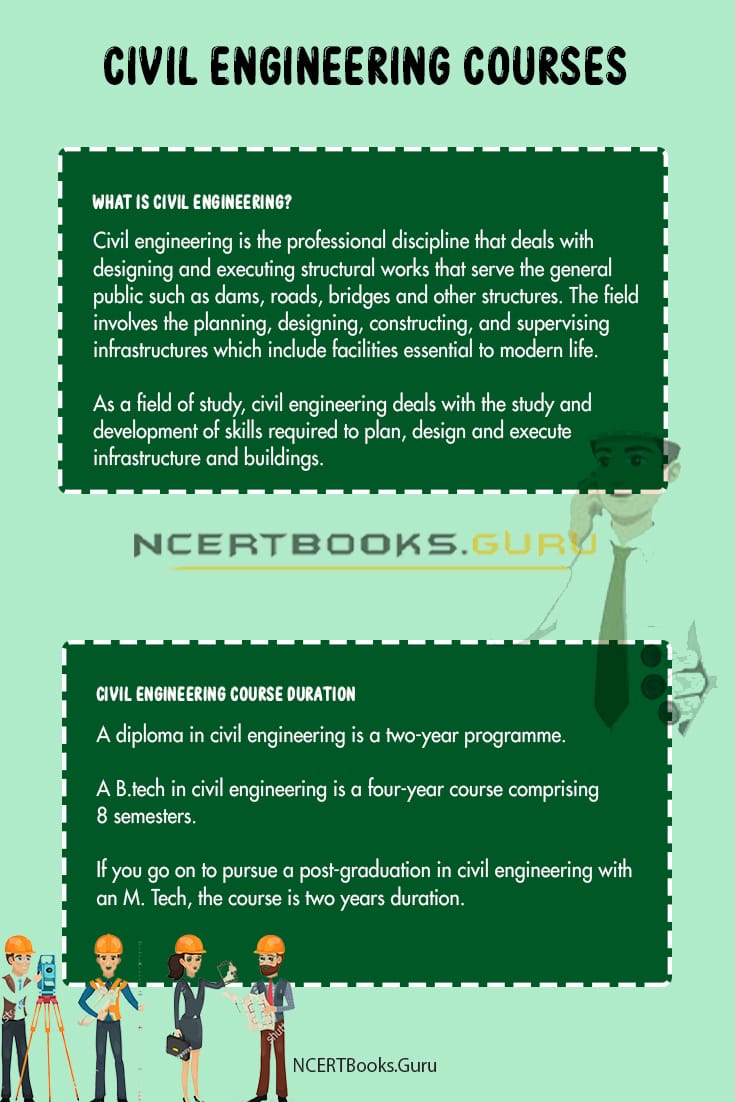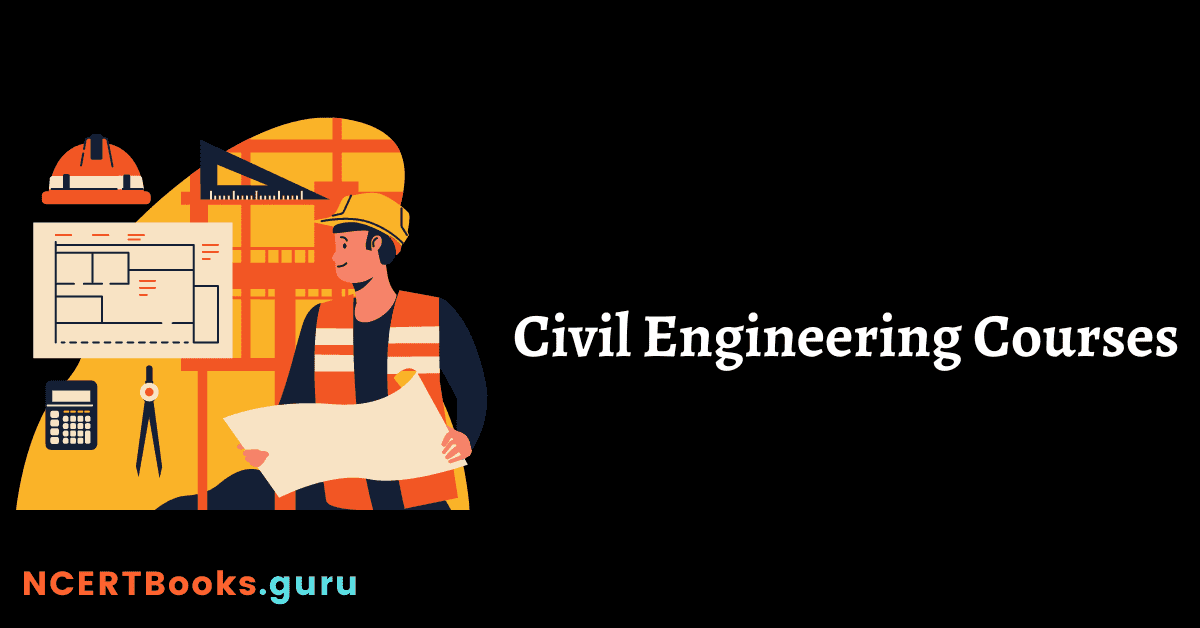Civil Engineering Courses: The world will never stop progressing and as our society advances, it will need new and modern infrastructure to support it. Apart from this, old structures do also become obsolete generating the need for new infrastructure to replace them. Given these facts, Civil engineering is always going to remain in demand in an ever-developing world, especially so in developing countries such as India. It is a lucrative career choice for aspirants contemplating their future field of study. Let’s find out more about Civil Engineering Courses.
What is Civil Engineering?
One of the oldest branches of engineering, Civil engineering is the professional discipline that deals with designing and executing structural works that serve the general public such as dams, roads, bridges and other structures. The field involves the planning, designing, constructing, and supervising infrastructures which include facilities essential to modern life.
As a field of study, civil engineering deals with the study and development of skills required to plan, design and execute infrastructure and buildings. However, it’s not just about the construction of new buildings, but about maintenance, repair, refurbishment, improving and modernising infrastructure as well.
Civil Engineering Courses List
If you choose to become a civil engineer and pursue one of the Civil Engineering Courses, there are several specialisations you can choose from.
- Construction Engineering
- Coastal and Ocean Engineering
- Geotechnical Engineering
- Fire protection engineering
- Structural Engineering
- General Engineering
- Bridge Engineering
- Irrigation Engineering
- Land development
- Materials Engineering
- Transportation engineering
- Urban Engineering
- Hydraulic Engineering
- Water Resources Engineering
Civil Engineering Course Duration
Depending on which Civil Engineering Courses you opt for, the duration of the course shall vary.
- A diploma in civil engineering is a two-year programme.
- A B.tech in civil engineering is a four-year course comprising 8 semesters.
- If you go on to pursue a post-graduation in civil engineering with an M. Tech, the course is two years duration.
Civil Engineering Course Fees
Undergraduate Course
The average course fee for B.Tech in Civil engineering is INR 2 lacs to 7 lacs in public institutes and 6 lacs to 14 lacs in private institutes. A study in one of the premium IITs or VIT will cost one anywhere between INR 2 lacs to 7 lacs for an undergraduate programme.
Postgraduate course
A full-time M.Tech can cost between INR 45K to 4 lacs, while a part-time and distance programme can cost anywhere around INR 50 K and 30 K respectively.
Certification Courses after Civil Engineering
In addition to the Civil Engineering Courses, there are also many add-on certification courses for professional and aspirant civil engineers which can add greatly to the practical skills relevant to the field. These can be around construction management, project management, green building, and many other facets and give you knowledge, practical understanding as well as requisite skills concerning the area of study.
Many certificate courses are available online on websites like Coursera, Udemy, edx etc. Apart from online certifications, many institutes offer certifications such as the Institute of Civil Engineering (ICE), AutoCAD Training Institutes.
See More: How to become a Civil Engineer in India
Top Civil Engineering Colleges in India
Civil engineering is a popular course in India and is offered by all major universities, colleges and institutes. Here’s a list of the top civil engineering in India.
- IIT Bombay – Indian Institute of Technology
- IIT Delhi – Indian Institute of Technology
- BITS Pilani – Birla Institute of Technology and Science
- Vellore Institute of Technology (VIT), Vellore
- DTU – Delhi Technological University
- IIT Kharagpur – Indian Institute of Technology
- College of Engineering, Pune
- SRM Institute of Science and Technology, Chennai
- IIT Roorkee – Indian Institute of Technology
- IIT Madras – Indian Institute of Technology

FAQs on Civil Engineering Courses
1. What is the eligibility criteria for a Civil engineering course?
- 10+2 qualification from a recognised board
- Minimum 50-60% average score in science subject with mathematics in class 12th.
- Cutoff of the 12th Boards score for the course and JEE Mains/Advances, MH CET and KCET scores, both as per cutoff set by the university are also considered.
2. Which course is best for civil engineering?
Due to the nature of this field that requires a core specialisation study, one is required to undertake a serious in-depth study of the curriculum and learn all the scientific specialisms. The undergraduate course for this branch of engineering, which is a full-time four-year course, is an in-depth course designed to cover all the foundational aspects of study in the field. If you are interested in a career in civil engineering, a full-time undergraduate B.Tech in Civil engineering with a specialisation of your choice is the best choice to make a good start to your career.
3. What are the 5 types of civil engineering?
Civil engineering deals with a variety of structures that include roads, bridges, railways, dams, residential buildings and even public utility structures such as airports. Hence there civil engineering has 5 main types of branches –
- Construction and Management engineering
- Geotechnical engineering
- Structural or architectural engineering
- Transport engineering
- Water engineering
4. What subjects are needed for civil engineering?
As a part of the eligibility criteria, an aspirant is required to have studied Science subjects (physics, chemistry, biology (not mandatory)) plus mathematics in their Senior secondary examination (11th and 12th). The subject needed to be eligible is PCM. PCBM is also eligible.
Conclusion
Civil engineers have always built, shaped and expanded societies to a vast extent and will continue to do so for centuries to come. If a career path that advances society and mankind excites you, civil engineering could be your calling. Make a thorough choice about your future and opt for civil engineering to build infrastructure that leaves a mark on the face of the earth.
A prerequisite to successful higher education is a strong foundational base that is developed during the secondary education years. NCERT books play a crucial role in the development of this educational base, they are the holy grail of secondary Indian education. Immerse yourself in the in-depth study of NCERT books with NCERTBooks.guru and get all the solutions online for free.
